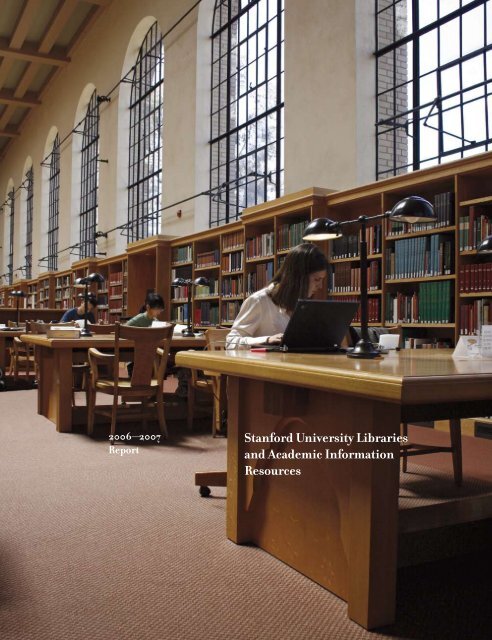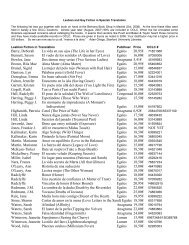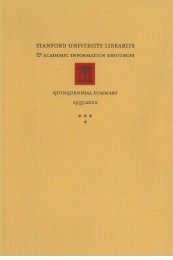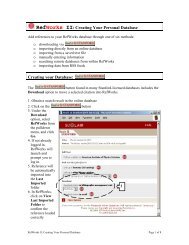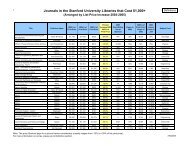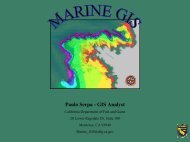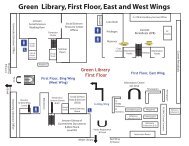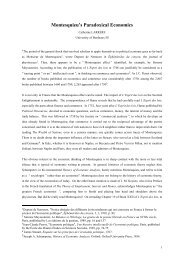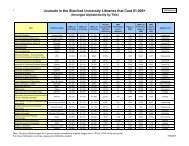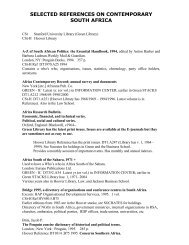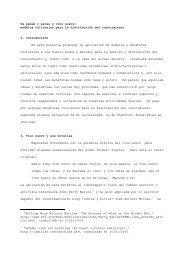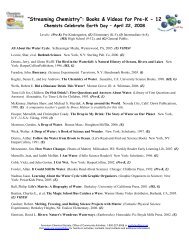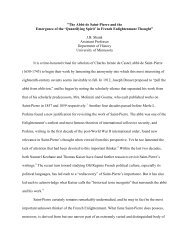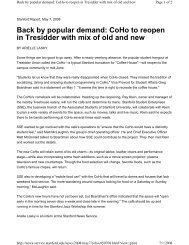The Challenge - Stanford University Libraries & Academic ...
The Challenge - Stanford University Libraries & Academic ...
The Challenge - Stanford University Libraries & Academic ...
Create successful ePaper yourself
Turn your PDF publications into a flip-book with our unique Google optimized e-Paper software.
2006—2007<br />
Report<br />
<strong>Stanford</strong> <strong>University</strong> <strong>Libraries</strong><br />
and <strong>Academic</strong> Information<br />
Resources
Seeking Information,<br />
Educating Readers<br />
<strong>The</strong> <strong>Challenge</strong><br />
When <strong>Stanford</strong> <strong>University</strong> announced a multi-year campaign called <strong>The</strong> <strong>Stanford</strong><br />
<strong>Challenge</strong> in October 2006, it also enunciated a transformative, long-term strategic<br />
agenda for the university based on: human health, environment and sustainability,<br />
international issues of peace and stability, multidisciplinary research, improving<br />
education at all levels, and fostering the arts and creativity. In the words of university<br />
president John L. Hennessy, “Our goal for <strong>The</strong> <strong>Stanford</strong> <strong>Challenge</strong> is nothing short of<br />
building a university for the 21st century and beyond: A university that will better serve<br />
the world through the quality, impact, and vision of its research, and through the<br />
new generations of leaders it will produce.”<br />
<strong>Stanford</strong> <strong>University</strong> <strong>Libraries</strong><br />
and <strong>Academic</strong> Information<br />
Resources<br />
© 2007<br />
by the Board of Trustees of the<br />
Leland <strong>Stanford</strong> Junior<br />
<strong>University</strong>.<br />
2006—2007<br />
Report<br />
library.stanford.edu<br />
Cover<br />
Students studying<br />
in the Lane Reading<br />
Room of the<br />
Bing Wing of Cecil H.<br />
Green Library.<br />
Above<br />
<strong>The</strong> Bing Wing of Cecil<br />
H. Green Library (the<br />
former Main Library)<br />
is the oldest and stateliest<br />
library structure<br />
on campus.<br />
2 3
Opposite Top<br />
A “TopicMap,” from<br />
the HighWire Press<br />
Web site, is a special<br />
Java applet designed to<br />
allow researchers the<br />
ability to navigate topics<br />
in a graphical form<br />
to give one a sense of<br />
context while navigating<br />
a large, tree-structured<br />
database.<br />
Right<br />
Michael A. Keller<br />
catches up with recent<br />
acquisitions.<br />
From the <strong>University</strong> Librarian<br />
We in the <strong>Stanford</strong> <strong>University</strong> <strong>Libraries</strong> & <strong>Academic</strong> Information Resources have seen<br />
many noteworthy achievements and milestones during the past year. Among these <strong>The</strong><br />
<strong>Stanford</strong> <strong>Challenge</strong>, without question, will have a profound impact on our future as a<br />
library, an academic computing service, and a congeries of publishing services in the<br />
21st century.<br />
<strong>The</strong> pace of innovation and intellectual growth around campus historically and<br />
presently has motivated the <strong>Libraries</strong> to advance the cutting edges of our professions. <strong>The</strong><br />
<strong>Stanford</strong> <strong>Challenge</strong> is cranking up that pace, and the <strong>Libraries</strong> are redoubling their efforts<br />
in order to meet that mandate, providing an ever-expanding array of services and<br />
resources in every possible medium and in myriad domains. While this is a daunting<br />
challenge indeed, I am delighted with the response of our staff, and we all take justifiable<br />
pride in our work, some aspects of which are showcased in this report. <strong>The</strong> vignettes<br />
included here will illuminate the strategic collaborations of multidisciplinary and globally-focused<br />
scholars that could not take place without the diverse assemblage of talented<br />
and energetic specialists, wide-ranging and deep collections, well-tuned services,<br />
attractive facilities, and easy-to-use technologies that constitutes the <strong>Libraries</strong> (in our<br />
expanded definition of the term).<br />
Your responses to this report are earnestly solicited.<br />
Michael A. Keller<br />
<strong>The</strong> Ida M. Green <strong>University</strong> Librarian<br />
Director of <strong>Academic</strong> Information Resources<br />
Publisher, HighWire Press<br />
Publisher, <strong>Stanford</strong> <strong>University</strong> Press<br />
Opposite Bottom<br />
Venerable volumes<br />
in Branner Earth Sciences<br />
Library: Bulletin<br />
of the Seismological<br />
Society of America date<br />
back to 1911, when it<br />
was published by the<br />
<strong>Stanford</strong> <strong>University</strong><br />
Press.<br />
4 5
<strong>The</strong> Initiative on Human Health<br />
<strong>The</strong> study of global human health has myriad connections at <strong>Stanford</strong>, ranging from the<br />
clinical disciplines, through the basic sciences, to cultural, political and policy matters.<br />
<strong>The</strong> <strong>Libraries</strong> support all these connections, of course, most obviously through the science<br />
branches. However, many of our collections and subject specialists have a significant<br />
hand in this initiative, as these examples attest.<br />
Global Tobacco-Free Research Initiative <strong>The</strong> Global Tobacco-Free<br />
Research Initiative is an ambitious project at <strong>Stanford</strong> to help<br />
nations move into a tobacco-free world. Cigarettes remain the<br />
world’s leading preventable cause of death. A billion people<br />
could die from tobacco-induced diseases in the 21st century,<br />
with the majority of these deaths in middle- to lower-income<br />
countries and a higher concentration in Asia. <strong>The</strong> problem<br />
is global even though the tobacco industry is based in just a<br />
few countries, including the United States. Researchers are<br />
studying how to reduce government reliance on taxes, overcome<br />
deceptive advertising, and address the medical issue<br />
of addiction. To support the project, the East Asia Library is<br />
assembling a broad, multi-lingual range of research materials<br />
in many formats, such as microfilms, e-books and serials.<br />
Dongfang Shao<br />
Head, East Asia Library<br />
Medical Discovery Resources: A Joint Effort Swain Chemistry and<br />
Chemical Engineering Library’s collecting scope includes resources<br />
on medicinal chemistry and drug discovery, part of an<br />
ongoing collaboration with Lane Medical Library and Falconer<br />
Biology Library. <strong>The</strong> <strong>Libraries</strong> work closely together to make<br />
sure that core materials are available to campus researchers,<br />
online whenever possible. Online resources originating in<br />
many fields are critical to effectively and efficiently locating<br />
information needed by both clinical and laboratory investigators<br />
and students across campus. <strong>Stanford</strong> students and<br />
researchers have access to databases on the Web that address<br />
complex, interdependent fields ranging from the highly<br />
applied, such as pharmacological technology, to the most<br />
advanced basic sciences, such as molecular and chemical biology.<br />
Collaboration and coordination is not limited to library<br />
resources: services such as reference help and database search<br />
assistance – to target these many resources effectively – are<br />
supported jointly by staff in Lane, Swain, and Falconer.<br />
Grace Baysinger<br />
Head, Swain Chemistry and<br />
Chemical Engineering Library<br />
Historical Literature of the Life Sciences <strong>The</strong> Falconer Biology<br />
Library coordinated purchase of the BIOSIS and Zoological<br />
Record Archives. <strong>The</strong>se purchases greatly expanded access at<br />
<strong>Stanford</strong> to the historical literature of the life sciences from<br />
1864 to the present. Together, they cover taxonomy, population<br />
biology, biodiversity, veterinary biology, cell biology,<br />
biochemistry, molecular biology, genetics, basic biomedical<br />
sciences, neurobiology, plant and animal biology, ecology,<br />
evolutionary biology, population biology, and related subjects<br />
providing in-depth indexes to students and researchers from<br />
numerous scientific disciplines.<br />
Michael L. Newman<br />
Head, Falconer Biology Library<br />
Electronic Journal Publishing HighWire Press, a division of the<br />
<strong>Stanford</strong> <strong>University</strong> <strong>Libraries</strong>, was created to ensure the continuing<br />
success of independent, scholarly publishers in their<br />
efforts to disseminate the latest, high-quality content worldwide.<br />
HighWire is the online host to five of the top six medical<br />
journals in the world, as well as the definitive editions<br />
of over 1,000 other journals, in the life sciences and other<br />
important fields of research. One of HighWire’s major goals of<br />
putting scholarly research online is to expand research to the<br />
far reaches of the world, places where traditional brick-andmortar<br />
paper libraries cannot keep pace with the needs<br />
of basic health care and human services. Many of the publishers<br />
supported by HighWire are part of such initiatives that<br />
include free access to poor countries: through projects of the<br />
World Health Organization, HINARI and AGORA, through a<br />
free access to developing nations program created by High-<br />
Wire, through cooperation with PatientInform, a layman’s<br />
Web site, and by offering free access to back content without<br />
restriction. HighWire is host to nearly two million free fulltext<br />
articles.<br />
John R. Sack<br />
Director and Associate Publisher,<br />
HighWire Press<br />
Opposite Top<br />
Heavily used materials<br />
in the Swain Chemistry<br />
and Chemical<br />
Engineering Library<br />
stacks.<br />
Opposite Bottom<br />
HighWire Press<br />
citation map shows a<br />
“genealogy” of article<br />
links.<br />
Left<br />
“A Way Out of the<br />
Smoking Jungle.” A<br />
California Department<br />
of Health Services<br />
image used to promote<br />
the Global Tobacco-Free<br />
Research<br />
Initiative.<br />
Right<br />
Detail of print serial<br />
subscriptions card file<br />
in Falconer Biology<br />
Library.<br />
6 7
<strong>Stanford</strong> Fisheries Policy Project Oceans today face daunting<br />
global challenges: pollution, climate change, and overfishing,<br />
among other threatening problems. Many major fisheries are<br />
in decline. Where scientific solutions are possible, they must<br />
be implemented hand-in-hand with political, legal, economic<br />
and social change. <strong>The</strong> <strong>Stanford</strong> Fisheries Policy Project,<br />
organized by the Hopkins Marine Station and the <strong>Stanford</strong><br />
Law School, is currently engaged in breakthrough studies in<br />
the management of fisheries. To support the project’s research,<br />
Miller Library is expanding its fields of collection to acquire<br />
additional materials on worldwide marine policy issues.<br />
Joe Wible<br />
Head, Miller Library of<br />
Marine Biology<br />
Geothermal, Electrical and Environmental Archive<br />
<strong>The</strong> Engineering Library, with the assistance of the Branner<br />
Earth Sciences Library and the <strong>Stanford</strong> Linear Accelerator<br />
Center, is acquiring the archival collection of the Rogers<br />
Engineering Company, a San Francisco consulting engineering<br />
firm specializing in geothermal, electrical and environmental<br />
projects worldwide from 1946-1990. Engineering<br />
project files, site maps, environmental impact reports, and<br />
scale models will support student and faculty research in<br />
renewable energy initiatives on campus. <strong>The</strong> collection will<br />
especially benefit the <strong>Stanford</strong> Geothermal Program, which<br />
offers specialized graduate degrees in geothermal reservoir<br />
engineering in coordination with the Department of Energy<br />
Resources Engineering.<br />
Helen Josephine<br />
Head, Engineering Library,<br />
Terman Engineering Center<br />
Left<br />
Page from Edwin V.<br />
Warren’s diary and<br />
ticket stub.<br />
Right<br />
Idyllically located in<br />
Pacific Grove, California,<br />
Miller Library of<br />
Marine Biology plays a<br />
central role in <strong>Stanford</strong>’s<br />
environmental research<br />
programs.<br />
Opposite<br />
Farquhar Transparent<br />
Globe of the Geocentric<br />
Celestial Sphere<br />
housed in the Physics<br />
Library.<br />
Witness to Western American Mining and Environment<br />
In 1903, <strong>Stanford</strong> student Edwin V. Warren, Class of 1908,<br />
rode his bicycle from his home in Pacific Grove to Sacramento,<br />
continuing by train, ship and foot to Douglas Island, just south<br />
of Juneau, Alaska. <strong>The</strong>re, while working in the Treadwell Gold<br />
Mines to earn money for tuition, as he did again the following<br />
year, Edwin kept his manuscript diaries in two small leatherbound<br />
volumes. Full of commentary on mining life and natural<br />
scenery, the journals are especially rich in observations<br />
on birds. A graduate student in the Department of History<br />
passed along word of the diaries’ existence and through the<br />
Lane Fund for Western United States History, the <strong>Stanford</strong><br />
<strong>University</strong> <strong>Libraries</strong> acquired the diaries from Warren’s<br />
grandson. Already the diaries have been used by an undergraduate<br />
writing her senior thesis on the geology of the area<br />
around the Treadwell mines. <strong>The</strong> many and varied themes<br />
of the diaries – from the social and working conditions in the<br />
mines to detailed observations of flora and fauna – illustrate<br />
the multidisciplinary nature of environmental history.<br />
Benjamin Stone<br />
Curator, American and<br />
British History<br />
Energy and Environmental Policy Resources Vulnerable areas<br />
of the environment are affected daily by natural factors such<br />
as climate change and human factors such as energy policy<br />
and patterns of resource consumption. Natural scientists<br />
and social scientists who work on environmental topics need<br />
access to daily technical and policy-related information. To<br />
meet this demand, an interdisciplinary group of social science<br />
and science and technology subject specialists jointly have<br />
purchased access to several daily topical newsletters: Environment<br />
& Energy Daily for legislative initiatives and deliberations,<br />
Greenwire for energy and environmental policy news, and Land<br />
Letter – <strong>The</strong> Natural Resources Weekly Report. <strong>The</strong>se important<br />
sources of environmental news from E&E Publishing, Inc.<br />
are supplemented by the publisher’s special reports on topics<br />
such as the Everglades, climate change, sustainable design<br />
and grid power from the sea.<br />
Anthony Angiletta<br />
Dean and Virginia Morrison Curator for<br />
Social Sciences, Demography and<br />
Population Studies<br />
<strong>The</strong> Initiative on the Environment and Sustainability<br />
Issues of the environment and sustainability tend to be complex, merging concerns<br />
with hard science, applied technology, policy, business, law, and social science.<br />
<strong>The</strong> <strong>Stanford</strong> <strong>Libraries</strong> are deeply engaged with this initiative through many of its<br />
collections across campus.<br />
8 9
<strong>The</strong> International Initiative<br />
In addressing critical issues of peace and security, governance, and advancing human<br />
well-being at local, regional and global levels, the scholars associated with the International<br />
Initiative require a bewildering breadth of library resources. Student interest in<br />
worldwide issues has never been higher, and the <strong>Libraries</strong> are racing to provide up-to-date<br />
materials from around the world, continuously acquiring materials in various formats<br />
from more than 100 countries and in more than 100 languages.<br />
Building a New Collection in Korean Studies Established in 2005,<br />
the East Asia Library’s Korean Collection strives to support the<br />
teaching, research, learning, and other activities and services<br />
of the recently-created Korean Studies program. <strong>The</strong> collection<br />
has been able to grow quickly, owing to the generous<br />
support of the <strong>Libraries</strong> and the Center for East Asian Studies,<br />
in close cooperation with the Korean Studies faculty. This year,<br />
the <strong>Stanford</strong> <strong>University</strong> <strong>Libraries</strong> were named as one of twelve<br />
member institutions of the Korean Collections Consortium of<br />
North America. As a member of the consortium, the East Asia<br />
Library has received a five-year grant from the Korea Foundation,<br />
which enables the purchase of a large number of books<br />
including thousands of volumes of Korean classic works.<br />
Kyungmi Chun<br />
Korean Studies Librarian<br />
<strong>The</strong> Local History of Bene Berak <strong>The</strong> <strong>Libraries</strong> acquired a significant<br />
archival collection documenting the founding and early<br />
history of the town of Bene Berak, near Tel Aviv. <strong>The</strong> collection<br />
was assembled by Haim Perl, a founder of Bene Berak<br />
in the 1920s and the great-grandfather of the late journalist<br />
Daniel Pearl ’85. Along with similar archives, such as the Simcha<br />
Blass collection on water resources in Israel acquired in<br />
2005 and the Eliasaf Robinson Collection on Tel Aviv acquired<br />
in 2006, the Haim Perl archive will provide unique research<br />
materials to support Middle Eastern studies and the International<br />
Initiative.<br />
Zachary Baker,<br />
Reinhard Family Curator<br />
of Judaica and Hebraica<br />
Collections<br />
Top<br />
Reference materials in<br />
the East Asia Library.<br />
Bottom<br />
Election pamphlet:<br />
“Profile of the Bene<br />
Berak Labor Council<br />
and Its Accomplishments”<br />
(late 1930searly<br />
1940s).<br />
Opposite<br />
<strong>The</strong> Korea Daily newspaper,<br />
available in the<br />
East Asia Library.<br />
10 11
Focus on South Asian Studies <strong>The</strong>re is a new multidisciplinary<br />
emphasis in South Asia on campus, as evidenced by the inauguration<br />
of the Center for South Asia in 2006. Correspondingly,<br />
there is growing student and faculty demand to broaden<br />
our Area Studies collection scope to include South Asian materials.<br />
For example, Tibetan studies – with its rich tradition of<br />
manuscript transmission dating from the seventh century – is<br />
a relatively new academic focus at the Department for Religious<br />
Studies and Center for Buddhist Studies. <strong>The</strong> <strong>Libraries</strong><br />
are responding to this development with important acquisitions<br />
of vernacular sources, some as original editions, some<br />
as microform facsimiles, and many electronic resources (such<br />
as the Digital Tibetan Library, an ongoing digitization project<br />
by <strong>The</strong> Tibetan Buddhist Resource Center). Furthermore, the<br />
Asian Studies program has been enriched by a timely gift of a<br />
new book fund in Burmese studies, the Steeve and Helen Kay<br />
Book Fund.<br />
Wojciech Zalewski<br />
Bibliographer for Religious Studies<br />
Combating HIV/AIDS in Southern Africa Timely and<br />
accurate information is vital to the success of an innovative<br />
project at <strong>Stanford</strong>: “Combating HIV/AIDS<br />
in Southern Africa: <strong>The</strong> Treatment Revolution and Its<br />
Impact on Health, Well-Being and Governance.” Based<br />
on the 2005 Group of 8’s commitment to put 10 million<br />
people infected with HIV/AIDS on treatment within<br />
five years, this project will research the impact of this<br />
treatment revolution on health, well-being and governance<br />
in sub-Saharan Africa. Supported by the <strong>Libraries</strong>’<br />
African Collection, 10 <strong>Stanford</strong> faculty and instructors<br />
teach related courses on African health issues, of<br />
which the fight against HIV/AIDS continues<br />
to occupy center stage.<br />
Karen Fung<br />
Curator, African Collection<br />
Top<br />
Meyer Library computer<br />
clusters provide<br />
a variety of specialized<br />
software, as well<br />
as peer consulting<br />
from expert student<br />
workers.<br />
Middle<br />
Leaf from Tibetan<br />
prayer book.<br />
Bottom<br />
J. Henry Meyer<br />
Memorial Library is<br />
swarmed by bicycles<br />
during Dead Week.<br />
Opposite Left<br />
Tibetan monk praying<br />
as he reads scripture<br />
similar to facing<br />
image.<br />
Opposite Right<br />
Digitizing a fragile object<br />
in the Preservation<br />
Digital Imaging<br />
Facility.<br />
Middle Eastern Film Series Throughout the academic year, the<br />
<strong>Libraries</strong>’ Islamic and Middle Eastern Collections sponsored<br />
a series of showings of feature films from the Middle East,<br />
one of which was the Egyptian hit film <strong>The</strong> Yacoubian Building.<br />
Through the auspices of Abderahman Salaheldin, Consul<br />
General of Egypt in San Francisco, its director, Marwan<br />
Hamed, and its star, renowned actress Yousra, were invited to<br />
a reception in the Munger Rotunda. Guests viewed a short film<br />
by Mr. Hamed and participated in a panel discussion at which<br />
the director and actress addressed issues of free speech and<br />
film making in the Middle East, from practical matters such<br />
as the impact of financial restraints on directors to universal<br />
questions such as the role of women in film and society.<br />
John Eilts<br />
Curator, Middle East Collection<br />
12 13
Multidisciplinary Research Across the <strong>University</strong><br />
Although the three initiatives in human health, environmental sustainability, and<br />
international affairs are <strong>Stanford</strong>’s largest and broadest multidisciplinary efforts, there<br />
are other significant activities occurring throughout the university that are also aimed at<br />
seeking solutions to societal problems and improving the world around us. Multidisciplinary<br />
programs involve collaborative research and scholarship from several disciplines<br />
and often two or more schools. Library subject specialists, who can provide discovery,<br />
acquisition, and access to diverse materials, often become active members of research<br />
teams studying complex issues from multiple viewpoints.<br />
Geographic Information Systems (GIS) Across Campus<br />
Branner Earth Sciences Library and Map Collections and the<br />
Social Sciences Data Center in Green Library provide support<br />
for patrons using Geographic Information Systems (GIS). GIS<br />
are a suite of hardware, software and data that allow a user to<br />
build multi-layered maps based upon the similarity of geographic<br />
space. <strong>The</strong> layers of disparate data are then queried<br />
to elucidate complex relationships between the information<br />
displayed in a graphical format. Patterns become apparent<br />
that would not have been readily seen were the data displayed<br />
in another form. This set of tools is used widely across campus<br />
by faculty and students in the fields of epidemiology, earth<br />
sciences, archaeology, anthropology, business, urban planning,<br />
engineering, and conservation biology. As the hub of<br />
GIS support on campus, the <strong>Libraries</strong> foster and enhance their<br />
use across a wide variety of disciplines and in all the schools;<br />
an important consideration as work becomes increasingly<br />
multidisciplinary across campus.<br />
Julie Sweetkind-Singer<br />
Head, Branner Earth<br />
Sciences Library<br />
Spoken Word Archive of Contemporary Thinkers Michael Toms<br />
and Justine Willis Toms, Co-Founders and Co-Presidents<br />
of New Dimensions Broadcasting Media Network, donated<br />
the entire New Dimensions archive to the <strong>Stanford</strong> <strong>University</strong><br />
<strong>Libraries</strong>. Comprising 35 years, about 6,000 hours, of recordings<br />
heard on public radio throughout the world, the recordings<br />
include interviews with the Dalai Lama, Krishnamurti,<br />
Linus Pauling, Joseph Campbell, Timothy Leary, Deepak Chopra,<br />
Bill Moyers, Alice Walker, Maya Angelou and about 3,000<br />
others. New Dimensions’ guests have included leaders whose<br />
papers are archived at <strong>Stanford</strong>, including utopian architect<br />
and thinker R. Buckminster Fuller and Stewart Brand, creator<br />
of <strong>The</strong> Whole Earth Catalog, thus creating a rich, multimedia<br />
trove of opportunities for students to explore the spoken and<br />
written words of these important thinkers, as well as to incorporate<br />
the spoken word into their own course projects.<br />
Roberto Trujillo<br />
Head, Department of Special<br />
Collections and Field Curator<br />
for Special Collections<br />
Opposite<br />
A technician sets up<br />
a book to be automatically<br />
scanned by<br />
<strong>Stanford</strong>’s page-turning<br />
robot.<br />
Top<br />
Many sorts of maps<br />
are housed in the<br />
Branner Earth Sciences<br />
Library along with<br />
extensive geo-referenced<br />
digital data.<br />
Financial Mathematics: A Case Study in Interdisciplinary Degrees<br />
<strong>The</strong> Interdisciplinary Master of Science Degree in Financial<br />
Mathematics is a relatively new program that requires carefully<br />
coordinated support from the <strong>Libraries</strong>. Most graduates<br />
of the program find positions as quantitative modelers and<br />
traders at investment banks and hedge funds. Faculty from<br />
four departments – Mathematics, Statistics, Economics, and<br />
Management Science & Engineering – as well as the Graduate<br />
School of Business plan the curriculum and course offerings.<br />
<strong>The</strong> program also sponsors a well attended Financial Mathematics<br />
Seminar open to the public. <strong>The</strong> 2006-2007 series<br />
featured academic speakers from Columbia, Chicago, Princeton,<br />
London and Zurich and leading industry speakers from<br />
Credit Suisse, Bloomberg, and the Federal Reserve Board,<br />
among others. In response to student and faculty requests,<br />
the Math Library has begun an acquisition program for select<br />
titles in Financial Mathematics.<br />
Linda Yamamoto<br />
Head, Mathematical &<br />
Computer Sciences Library<br />
Middle<br />
A selection of New<br />
Dimensions archival<br />
recordings hints at<br />
the variety of topics<br />
covered.<br />
Bottom<br />
Much used volumes<br />
of the Annuals of Mathematical<br />
Statistics.<br />
14 15
Multimedia Digitization in the Humanities In parallel to highprofile<br />
book-digitization projects like Google Book Search,<br />
the <strong>Libraries</strong> are deeply engaged in collecting and creating<br />
other forms of digital collections that are of increasing importance<br />
and utility to students and faculty. For example, much of<br />
two documentary photography collections were recently made<br />
available as digital resources: the Douglas Menuez Photography<br />
Collection (focusing on the history of Silicon Valley), and<br />
the <strong>Stanford</strong> Historical Photograph Collection. <strong>The</strong>se collections<br />
allow students from many disciplines – history, art, and<br />
business, to name a few – to engage with striking historical<br />
materials, as well as to gain a deep visual sense of <strong>Stanford</strong>’s<br />
own historical and geographical place. <strong>The</strong> <strong>Libraries</strong> recently<br />
acquired important audio collections to complement extensive<br />
holdings in the Archive of Recorded Sound, including<br />
Smithsonian Global Sound, which is a listening library of<br />
the world’s aural and musical traditions, with rich searching<br />
features and unparalleled access to unique historical and<br />
contemporary recordings of music and the spoken word. This<br />
collection is of interest across the disciplines, for students not<br />
only of the world’s arts and cultures, but also of all the<br />
human sciences.<br />
Glen Worthey<br />
Humanities Digital<br />
Information Service<br />
Stephen Jay Gould Archive and Collection:<br />
<strong>The</strong> Working of a Public Scholar Stephen Jay Gould was an Ameri-<br />
can paleontologist, evolutionary biologist, and historian of<br />
science. He was one of the most influential and widely read<br />
writers of science of his generation and spent most of his<br />
career teaching at Harvard <strong>University</strong> and working at the<br />
American Museum of Natural History in New York. His widow,<br />
Rhonda Roland Shearer of New York City, donated Professor<br />
Gould’s extensive professional and personal papers as well as<br />
his personal library, including his rare book collection, to the<br />
<strong>Stanford</strong> <strong>Libraries</strong>. <strong>The</strong> manuscript and archive collection<br />
of Gould exceeds 300 linear feet and the collection of books<br />
numbers in the thousands. Together, these materials can<br />
reveal the methods and intellectual processes of this distinguished<br />
educator and researcher.<br />
Michael A. Keller<br />
<strong>The</strong> Ida M. Green <strong>University</strong><br />
Librarian and Director of <strong>Academic</strong><br />
Information Resources<br />
<strong>The</strong> Future of the United States Census <strong>The</strong> Social Sciences<br />
Resource Center hosted a symposium and panel discussion<br />
entitled “Censuses and Surveys: Still Useful for the Common<br />
Good” Jointly sponsored with the School of Humanities and<br />
Sciences and the Institute for Research in the Social Sciences,<br />
the symposium featured nationally-recognized speakers who<br />
explored the challenges of data collection, accuracy, declining<br />
participation, and privacy concerns surrounding the United<br />
States Census. Because the census has such broad impact on<br />
so many aspects of American life, it invites, as well as supports,<br />
broadly multidisciplinary scholarship.<br />
William Wheeler<br />
Curator for Anthropology,<br />
Psychology, and Sociology<br />
Opposite<br />
Lawrence Manning, A.<br />
M. Peterson, and O. G.<br />
Villard, <strong>Stanford</strong> <strong>University</strong><br />
Department of<br />
Electrical Engineering,<br />
1950. Photograph<br />
from the <strong>Stanford</strong><br />
Historical Photograph<br />
Collection.<br />
Left<br />
Stephen Jay Gould<br />
bookplate. <strong>The</strong> papers<br />
and library of the late<br />
biologist and popular<br />
essayist have been<br />
given to <strong>Stanford</strong>.<br />
Below<br />
<strong>Stanford</strong> alums and<br />
Sun Microsystems<br />
co-founders Vinod<br />
Khosla (left) and Scott<br />
McNealy (seated in<br />
chair), with Frank<br />
Caufield and John<br />
Doerr of Kleiner-<br />
Perkins, 1992.<br />
Above<br />
<strong>Stanford</strong> Engineering<br />
students, ca. 1912.<br />
Photograph from the<br />
<strong>Stanford</strong> Historical<br />
Photograph Collection.<br />
16 17
Improving K-12 Education /Reinventing Graduate<br />
Education /Extending the Renaissance in<br />
Undergraduate Education<br />
<strong>The</strong> <strong>Stanford</strong> <strong>Challenge</strong> addresses teaching methods and results, both as a way of ensuring<br />
an exceptional student experience at <strong>Stanford</strong> and as a pressing social issue throughout<br />
society. By developing education leadership and policy, as well as by designing and<br />
testing model learning environments, <strong>Stanford</strong>’s “Improving K-12 Education” programs<br />
confront challenges faced by the public education system in the United States. On campus,<br />
programs for “Extending the Renaissance in Undergraduate Education” and “Reinventing<br />
Graduate Education” strive to assure unparalleled opportunities for <strong>Stanford</strong><br />
students to become effective leaders in a complex global society. <strong>The</strong> <strong>Libraries</strong> are essential<br />
in providing materials and support to ensure educational success at all levels.<br />
Above<br />
A traditional tool, an<br />
unabridged dictionary,<br />
remains in frequent<br />
use in the Cubberley<br />
Education Library.<br />
Opposite Top<br />
<strong>The</strong> <strong>Stanford</strong> <strong>University</strong><br />
Press publishes a<br />
lively list of scholarly<br />
and policy-related<br />
works in many<br />
disciplines, including<br />
education.<br />
Opposite Bottom<br />
Joachim von Sandrart,<br />
Iconologia Deorum, oder<br />
Abbildung der Götter…<br />
Nürnberg: Gedruckt<br />
durch C.S. Froberger,<br />
in Verlegung des Authoris,<br />
1680. Acquired<br />
through the <strong>Stanford</strong><br />
<strong>University</strong> Bookstore<br />
Fund.<br />
Library Information Center as Hub for Information Literacy<br />
As <strong>Stanford</strong> seeks to produce graduates who are independent<br />
thinkers and problem solvers, the Information Center plays<br />
a crucial role through its emphasis on lifelong information<br />
literacy. A vital point of first contact for many visitors to Green<br />
Library, the Center provides answers to research questions in<br />
person, by telephone, by email and by Instant Messaging. <strong>The</strong><br />
Information Center’s Instruction Program also provides students<br />
with the skills necessary to discover, evaluate, and use<br />
information from a variety of sources and in multiple formats.<br />
All freshmen attend information literacy workshops as part<br />
of the Program in Writing and Rhetoric, as well as the Structured<br />
Liberal Education Program. Honors students also attend<br />
advanced information literacy workshops as they prepare to<br />
write their Honors theses.<br />
Chris Bourg<br />
Head, Information Center<br />
Student Discoveries in Special Collections Access to rare and<br />
unique materials is a defining feature of both undergraduate<br />
and graduate education at <strong>Stanford</strong>. In most cases, Special<br />
Collections acquisitions are made with teaching and research<br />
value in mind. Subject specialists conducted more than 100<br />
class sessions this year using prior collaborative sessions with<br />
faculty to tailor material selection to precise course content.<br />
Students examined a wide array of antiquarian and modern<br />
materials and received expert assistance with research<br />
papers. Separately, a group of students, on their own initiative,<br />
organized and attended the Green Teas presentations by faculty,<br />
subject specialists and collectors on bibliophilic topics.<br />
Combined, these programs helped highly motivated students<br />
navigate their first research experiences with Special Collections<br />
materials.<br />
John E. Mustain<br />
Rare Book Librarian and Classics<br />
Bibliographer, Special Collections<br />
Curriculum Resources for Teachers Cubberley Library serves the<br />
School of Education, a leading center of educational research,<br />
to improve K-12 education in the United States. <strong>The</strong> continually<br />
expanding Cubberley Curriculum Collection includes<br />
hands-on science kits, newly published textbooks, and a wide<br />
range of the best in children’s literature to support language<br />
arts instruction. <strong>The</strong> Library recently revised its Web pages,<br />
using an open source content management system known as<br />
Drupal, to give better access to library resources. Additionally,<br />
new pages were created to serve the <strong>Stanford</strong> Teacher Education<br />
Program, a nationally renowned, innovative program<br />
leading to a Master of Arts in Education and a preliminary<br />
California teaching credential. Electronic resources, in addition<br />
to on-site books and journals on educational reform<br />
and teaching methods, are frequently consulted by members<br />
of the <strong>Stanford</strong> community as well as by local elementary and<br />
secondary teachers.<br />
Kathryn M. Kerns<br />
Head, Cubberley Education Library<br />
Advances in Information Technology Through <strong>Academic</strong> Computing,<br />
<strong>Stanford</strong> <strong>University</strong> <strong>Libraries</strong> & <strong>Academic</strong> Information<br />
Resources provides faculty and students with technology,<br />
expertise and resources to support learning, research and<br />
teaching. <strong>The</strong> Student Computing unit provides technology<br />
enhanced labs and classrooms in <strong>Stanford</strong>’s 77 student residences,<br />
Meyer, Green and the branch libraries, and Tresidder<br />
Student Union, as well as consulting, technology help, and<br />
training for <strong>Stanford</strong>’s students. <strong>The</strong> Faculty Services unit<br />
hosts <strong>Academic</strong> Technology Specialists to work with faculty on<br />
their use of technology in teaching and research, an <strong>Academic</strong><br />
Technology Lab, and provides CourseWork, the campus<br />
course management system. <strong>The</strong> Digital Library Systems<br />
and Services unit operates technology services, systems and<br />
infrastructure for the <strong>Stanford</strong> <strong>University</strong> <strong>Libraries</strong>, including<br />
the library management system and component parts, Web<br />
and access systems, digitization lab software, and the core<br />
server, database, storage, backup and Web infrastructure. As<br />
the <strong>Libraries</strong> move to an increasingly digital profile, <strong>Academic</strong><br />
Computing provides and manages digital resources<br />
for the <strong>Libraries</strong> through their complete lifecycle, including<br />
digitization, metadata design, specification and generation,<br />
digital preservation, online discovery and access, and overall<br />
management of digital materials.<br />
Lois Brooks<br />
Director, <strong>Academic</strong> Computing<br />
<strong>University</strong> Publishing Promotes Educational Research<br />
In line with its ongoing efforts to develop a publishing program<br />
that supports and complements the academic strengths<br />
and intellectual mission of the <strong>University</strong>, <strong>Stanford</strong> <strong>University</strong><br />
Press has published a core list of titles covering the breadth of<br />
education research, from pre-school and K-12 through higher<br />
education at both the undergraduate and graduate levels. <strong>The</strong><br />
Press has published prominent authors from the <strong>Stanford</strong><br />
School of Education and sought cutting-edge research that<br />
will improve our nation’s public education system, inform<br />
scholars and students, and educate our future leaders. Our<br />
commitment to education research will continue and grow in<br />
coming years, with education now being a major focus of our<br />
acquisitions.<br />
Geoffrey R. H. Burn<br />
Managing Director,<br />
<strong>Stanford</strong> <strong>University</strong> Press<br />
Clarifying Copyright for Books Copyright law has become a pressing<br />
issue as libraries and businesses develop plans to digitize<br />
materials and make works in the public domain widely available.<br />
In April, the <strong>Stanford</strong> <strong>University</strong> <strong>Libraries</strong> released the<br />
Copyright Renewal Database, dubbed the “Copyright Determinator,”<br />
which was developed under a grant from the Hewlett<br />
Foundation. Available on the <strong>Libraries</strong>’ public Web site, the<br />
Determinator brings all 1923-1963 U.S. book-renewal records<br />
together in a single database and, more significantly, makes<br />
searchable renewal records that had previously been distributed<br />
only in print. <strong>The</strong> <strong>Stanford</strong> <strong>Libraries</strong> are pleased to be<br />
able to offer this service to the scholarly community and are<br />
working with national partners to integrate this data into a<br />
much broader system for the analysis of copyright status.<br />
Mimi Calter<br />
Executive Assistant to<br />
the <strong>University</strong> Librarian<br />
18 19
Ira Nowinski: Photographs of Native Americans <strong>The</strong> <strong>Libraries</strong><br />
have acquired a number of collections of photographs by Ira<br />
Nowinski, the latest of which is a collection of 71 photographs<br />
of California Native Americans in the 21st century. This collection<br />
includes prints of Native Americans at the Chumash<br />
Pow Wow, the Morongo Indian Reservation, Palm Springs,<br />
Hupa Valley, Grinding Rock State Park, Hopland Indian<br />
Reservation, the Santa Ynes Reservation, and the Klamath<br />
River Valley, all in California. <strong>The</strong>se photographs of California<br />
Native Americans augment <strong>Stanford</strong>’s holdings on Nowinski,<br />
including an archive of some 15,000 prints and negatives.<br />
Benjamin Stone<br />
Curator, American and British History<br />
Roberto Trujillo<br />
Head, Department of Special Collections<br />
and Field Curator for Special Collections<br />
Irving Rosenthal: Beat Generation Editor and Novelist<br />
<strong>The</strong> <strong>Stanford</strong> <strong>University</strong> <strong>Libraries</strong> obtained the extraordinary<br />
archive of Irving Rosenthal, editor of numerous important<br />
Beat writers and author of the novel, Sheeper. Acquired in part<br />
through the Charlotte A. Felton Fund and the Kline-Roethke<br />
Book Fund, this archive builds on the <strong>Stanford</strong> <strong>University</strong> <strong>Libraries</strong>’<br />
holdings of the Beats. As editor of <strong>The</strong> Chicago Review<br />
in the late 1950s, Rosenthal published poetry by Jack Kerouac,<br />
prose from Edward Dahlberg, and the first parts of William<br />
Burroughs’ Naked Lunch. Subsequent moves to New York and<br />
Tangiers led to friendships with Allen Ginsberg, Herbert<br />
Huncke, Paul Bowles, and Jack Smith. Significant correspondence<br />
and materials from all these figures, among many others,<br />
are included in the archive.<br />
Annette Keogh<br />
Curator, American and<br />
British Literature<br />
Engaging the Arts and Creativity<br />
<strong>The</strong> arts play a central role in training students – future leaders – to think creatively.<br />
In keeping with this concept, the <strong>Libraries</strong> continually strive to expand their resources<br />
to ensure ample opportunity for creative discovery in the arts. Having resources to<br />
illustrate the richness of human culture is vital to maintaining the role of the arts<br />
and humanities in a liberal arts education.<br />
Left<br />
<strong>The</strong> Music Library<br />
collects musical<br />
resources for theorists,<br />
historians, and<br />
performers, including<br />
sheet music.<br />
Right<br />
Ira Nowinski, Chumash<br />
Pow Wow, Malibu,<br />
California, 2006.<br />
From the Ira Nowinski<br />
collection, California<br />
Native Americans in<br />
the 21st century.<br />
Opposite Left<br />
Charles Hobson, Degas<br />
Dancing, monotype.<br />
From the Charles<br />
Hobson collection:<br />
design and production<br />
materials for artist’s<br />
books, 1985-2006.<br />
Charles Hobson overlays<br />
historical images,<br />
texts, and drawings in<br />
technically-demanding,<br />
complex and<br />
rich ways to produce<br />
unique books.<br />
Opposite Right<br />
Poster celebrates 50<br />
years of the Monterey<br />
Jazz Festival.<br />
Charles Hobson: Book Artist Charles Hobson is an artist who<br />
uses pastel, monotype and other printmaking variations to<br />
construct images for books and works on paper. <strong>The</strong> <strong>Stanford</strong><br />
<strong>Libraries</strong> have been collecting his works for many years. In<br />
2007 Hobson donated his archive to the <strong>Libraries</strong>. This extensive<br />
archive includes the working drafts, ideas, prototypes,<br />
photography, monotypes, prints, and production material<br />
for all of his artist’s books. <strong>The</strong> archive reveals in depth the<br />
creative processes, technical solutions, and development of<br />
ideas in his work over time. In so doing, it reveals much about<br />
the interplay of creativity, expression, and history of artistic<br />
ideas. <strong>The</strong> Department of Special Collections is now planning<br />
to exhibit selections from the Hobson archive in the <strong>Libraries</strong><br />
in conjunction with a related exhibit at the Cantor Arts Center.<br />
<strong>The</strong> <strong>Libraries</strong> will also be publishing a catalog for these<br />
exhibits.<br />
Roberto Trujillo,<br />
Head, Department of Special Collections<br />
and Field Curator<br />
for Special Collections<br />
Monterey Jazz Festival Recordings <strong>The</strong> <strong>Libraries</strong>’ Archive of<br />
Recorded Sound holds the archival recordings of the Monterey<br />
Jazz Festival performances dating back to 1958. <strong>The</strong> preservation<br />
of this collection is a multi-year, multi-part project,<br />
initiated jointly by the <strong>Stanford</strong> <strong>University</strong> <strong>Libraries</strong> and the<br />
Monterey Jazz Festival, to preserve original audio and video<br />
recordings in the collection. <strong>The</strong>se recordings document the<br />
world’s longest running jazz festival through recorded performances<br />
of the most significant jazz musicians of the second<br />
half of the 20th century. Grant funds have been awarded by the<br />
Grammy Foundation, the National Historical Publications and<br />
Records Commission, and the Save America’s Treasures grant<br />
programs to digitize the fragile, aging and degrading media<br />
and to improve the storage of the original tapes. High-quality<br />
listening copies are now available, providing unprecedented<br />
access to this unique collection.<br />
Jerry McBride<br />
Head, Music Library and<br />
Archive of Recorded Sound<br />
20 21
Librarians and Humanists Exploring Virtual Worlds<br />
Working with Michael Shanks, Professor of Classics, the<br />
History of Science & Technology program in the Humanities<br />
Resource Group is collaborating with the <strong>Stanford</strong> Humanities<br />
Lab on a project in the virtual world Second Life. Together,<br />
they have created an archive of the works of media and film<br />
artist Lynn Hershman, who also contributed substantially to<br />
the project. Funded in part by the Daniel Langlois Foundation,<br />
the project built a historical archive of this important artist’s<br />
work in a 3-d virtual world owned and operated entirely by its<br />
residents. Many <strong>Stanford</strong> students populate areas in Second<br />
Life, including two islands for graduate students in the School<br />
of Education. Its virtual world was also used as a basis for<br />
projects in the “Humans and Machines” course offered to undergraduates<br />
in the Introduction to the Humanities Program.<br />
Henry Lowood<br />
Curator, Germanic and<br />
History of Science Collections<br />
Chinese Calligraphy and Stone Carvings As part of the ongoing<br />
effort to enhance the visitor experience at the East Asia<br />
Library, the calligraphic works of C.C. Wang and Niu Kesi’s<br />
stone carvings were exhibited over the past year. C.C. Wang<br />
(Wang Chi-Ch’ien or Wang Jiqian, 1907-2003), distinguished<br />
artist, collector and connoisseur, was born in Suzhou, Jiangsu<br />
Province, China, and studied traditional Chinese painting. He<br />
contributed greatly to upgrade both the art history value and<br />
art market value of Chinese painting. Niu Kesi (“Superior to<br />
Marx” in Chinese) was born in 1954 in Qingtian County, Zhejiang<br />
Province, China, and studied stone carvings under his<br />
father, Tingjiao Li (1921-1971). He has since been regarded<br />
as a pioneer of large scale stone carving, skillfully combining<br />
artistic vision with careful, precise carving.<br />
Zhaohui Xue<br />
Chinese Studies Librarian,<br />
East Asia Library<br />
Avant-Garde Remembered <strong>The</strong> Art and Architecture Library<br />
recently purchased three journals of the Parisian avantgarde<br />
– Le Coq (subsequently titled Le Coq Parisien) (1920),<br />
Réverbères (1938-39), and Néon (1948-49) – in honor of Alex<br />
Ross on his retirement as Head Librarian after 32 years of service.<br />
Editors and contributors include the Dadaist and Surrealist<br />
luminaries Tristan Tzara, Max Ernst, André Breton, and<br />
Jean Cocteau. <strong>The</strong>se rare ephemera build upon the Library’s<br />
growing collection of avant-garde journals, each exemplifying<br />
that medium’s multiple capacities for artistic interdisciplinarity,<br />
literary idiosyncrasy, political assertion, and graphic<br />
experimentalism. An exhibition of these journals kicks off<br />
the Library’s new exhibition program and will be on display<br />
through the 2007 Fall Quarter.<br />
Anna Fishaut<br />
Assistant Art Librarian, Art and<br />
Architecture Library<br />
Rejuvenating Art at the Visual Resources Center Formerly part<br />
of the Department of Art & Art History but transferred to the<br />
<strong>Libraries</strong> in September 2006, the Visual Resources Center<br />
completed its first year as a unit of the Art and Architecture<br />
Library. With strengths in European, American, Chinese and<br />
Japanese art and architecture, the VRC’s collection of over<br />
300,000 35mm slides and 34,000 digital images primarily<br />
supports teaching and research in art and art history. While<br />
work continues on migrating the existing collection from slide<br />
to digital, driven primarily by Art faculty request, important<br />
progress is being made in expanding the scope of the existing<br />
collection and extending VRC services to the greater <strong>Stanford</strong><br />
community.<br />
Peter Blank<br />
Head, Art and<br />
Architecture Library<br />
Left<br />
Artist Lynn Hershman’s<br />
presence in Second<br />
Life is informed by her<br />
decades of pioneering<br />
work in conceptual and<br />
video art.<br />
Right<br />
Calligraphy and Stone<br />
Carvings exhibition<br />
enriches the East Asia<br />
Library public area.<br />
Below<br />
Edison Diamond Disc<br />
Phonographs Sheraton<br />
Model C 150, 1917<br />
(left) and Chippendale<br />
Model C 250, 1919<br />
(right) housed in the<br />
Archive of Recorded<br />
Sound.<br />
Left<br />
Issue from Le Coq<br />
sheds light on early<br />
20th century artistic<br />
trends.<br />
Right<br />
Viewing traditional<br />
slides at a light table<br />
in the Visual Resources<br />
Center.<br />
Below<br />
Manipulating digital<br />
images in the Visual<br />
Resources Center.<br />
22 23
Benefactors<br />
Thanks and<br />
Endowed Book Funds at the <strong>Stanford</strong><br />
<strong>University</strong> <strong>Libraries</strong><br />
Endowed book funds provide deep collectionbuilding<br />
to support advanced research. Several<br />
hundred donors – alumni, families, and others –<br />
have created focused acquisition funds in beloved<br />
subjects to enable the <strong>Libraries</strong> to collect in<br />
depth and breadth. Without these enduring gifts,<br />
<strong>Stanford</strong>’s research and educational resources<br />
would not have attained the level of distinction we<br />
now almost take for granted. Endowment income<br />
currently provides more than one quarter of our<br />
total acquisitions budget. A minimum gift of<br />
$25,000 makes this program the most accessible<br />
of all named endowments at <strong>Stanford</strong>; successive<br />
gifts often span generations.<br />
For more information about endowing a book fund<br />
and for current subject needs suggested by subject<br />
specialists, please contact the Library Development<br />
Office at 650-723-3866.<br />
New Endowed Book Funds<br />
<strong>The</strong> Richard L. Bennett Memorial Book Fund<br />
Ann Kay established an endowment to support<br />
the acquisition of works of fiction and materials<br />
relating to the history of the sciences in memory of<br />
her husband, Richard L. Bennett (AB ’52 AM ’53),<br />
who worked for 26 years at the <strong>University</strong> and was<br />
instrumental in the success of <strong>Stanford</strong>’s Centennial<br />
Campaign.<br />
<strong>The</strong> Steeve and Helen Kay Book Fund<br />
Steeve (MS ’75) and Helen Kay sponsored an<br />
endowment to support the acquisition and<br />
preservation of library materials at the East Asia<br />
Library, with a preference for materials relating to<br />
Burma/Myanmar.<br />
Donors to Existing Book Funds<br />
Lucie Harris Alexander<br />
Lucie King Harris Books for Music Fund<br />
Frederick and Marcia Backer<br />
Maria Hart Backer Memorial Book Fund<br />
Robert D. Bacon<br />
Robert D. Bacon Endowed Book Fund<br />
Salo W. and Jeannette M. Baron Foundation<br />
Jeannette Meisel and Salo Wittmayer Baron<br />
Book Fund<br />
John and Carol Binns, Jr.<br />
Bert Elliott Woodburn, Jr. Memorial<br />
Book Fund<br />
Michael and Janet Burd<br />
Janet and Michael Burd Book Fund<br />
Ruby B. H. Choy<br />
Melvin Leigh Ho Memorial Fund<br />
Jean Coblentz<br />
Galt-Coblentz Endowed Book Fund<br />
Charles and Jackie Davis, Jr.<br />
Judith L. Davis Memorial Book Fund<br />
Mark and Nadine Dunker<br />
Frances and Barney Bricker Book Fund<br />
Virginia E. Fehrenbacher<br />
Don E. Fehrenbacher Memorial<br />
Book Fund<br />
Herbert and Bernadine Fong<br />
Dr. Frank Y. Chuck and Dr. Bernadine<br />
Chuck Fong Family Book Fund<br />
James M. Friedman, Estate<br />
Jay Fund of the <strong>Stanford</strong> <strong>University</strong> <strong>Libraries</strong><br />
Tobey Baron Gitelle<br />
Jeannette Meisel and Salo Wittmayer Baron<br />
Book Fund<br />
Richard and Rona Goldstein<br />
Richard Jay and Rona Goldstein Book Fund<br />
Mr. and Mrs. Douglas Goodan<br />
Bill Goodan Book Fund in the History of Science<br />
Charles and Marcia Growdon<br />
Arthur C. Cohn Memorial Book Fund<br />
John K. B. Harris<br />
John Kiely Beebe Harris Book Fund<br />
Lawrence and Jane Harris, Jr.<br />
Lucie King Harris Books for Music Fund<br />
Acknowledgments<br />
Asterisk (*) following a name indicates<br />
the donor is deceased<br />
24 25
Lawrence and Margaret Harris III<br />
Lucie King Harris Books for Music Fund<br />
Maria Louise Harris<br />
Lucie King Harris Books for Music Fund<br />
Robert Cronley Harris<br />
Lucie King Harris Books for Music Fund<br />
Caroline H. Henderson<br />
Lucie King Harris Books for Music Fund<br />
Carlton and Linda Ho<br />
Melvin Leigh Ho Memorial Fund<br />
Elaine C. Ho<br />
Melvin Leigh Ho Memorial Fund<br />
Antoinette Howell, Estate<br />
Warren R. and Antoinette M. Howell<br />
Rare Book Fund<br />
Jackman Charitable Trust<br />
C. M. Jackman Charitable Trust Book Fund<br />
Donald and Robin Kennedy<br />
Robin and Donald Kennedy Fund for<br />
Jewish Studies<br />
Ronald P. Klein<br />
Milton and Annette Klein Book Fund<br />
J. Burke and Iris Hay-Edie Knapp<br />
J. Burke Knapp Book Fund<br />
Doris H. Linder<br />
Doris H. Linder Book Fund<br />
Woodford McClellan<br />
Bert Elliott Woodburn, Jr. Memorial<br />
Book Fund<br />
Maggie McComas<br />
Muller-McComas Book Fund<br />
Thomas and Joyce Moser<br />
Mary Churchill Small Moser Book Fund<br />
Mrs. Donald W. Moulton<br />
Donald W. and Anne M. Moulton<br />
Endowed Book Fund<br />
Henry Muller<br />
Henry Muller Fund<br />
Caroline Peck<br />
Templeton Peck Memorial Book Fund<br />
Catherine C. Peck<br />
Templeton Peck Memorial Book Fund<br />
Templeton Clift Peck and Carol Shapiro<br />
Templeton Peck Memorial Book Fund<br />
Regina Bandet Polkow<br />
Henry and Regina Bandet Fund for<br />
Jewish History and Culture<br />
Dana A. Rasmussen<br />
Sidney C. Rasmussen, Jr. Family Book Fund<br />
J. Chris Rasmussen<br />
Sidney C. Rasmussen, Jr. Family Book Fund<br />
Vivian Rasmussen<br />
Sidney C. Rasmussen, Jr. Family Book Fund<br />
Clifford Schireson and John Venekamp<br />
Clifford N. Schireson Book Fund<br />
Anne Jacobson Schutte<br />
Mildred Ashworth Jacobson Memorial<br />
Book Fund<br />
Christopher T. Seaver<br />
R. Arthur and Juliette Tiernan Endowed<br />
Book Fund<br />
Smart Family Foundation<br />
Allan Morgan Standish Library Fund<br />
Peter D. Stansky<br />
William Abrahams and Peter Stansky<br />
Book Fund<br />
Verna Pace Steinmetz<br />
Verna Pace Steinmetz Book Fund<br />
Mrs. Bernard M. Strean<br />
<strong>The</strong> James Ruffin Webb Book Fund<br />
Shirley Struble<br />
William I. and Shirley P. Struble Endowed<br />
Book Fund<br />
Robert and Shoshana Tancer<br />
Jeannette Meisel and Salo Wittmayer Baron<br />
Book Fund<br />
Dan Duncan Tarbell, Estate<br />
Dan Duncan Tarbell Library Book Fund<br />
George and Victoria Thacher<br />
Joseph Anthony Mecia Memorial Library Fund<br />
Mr. and Mrs. Dennis F. Wheeler<br />
Brent Eugene Barksdale Book Fund<br />
David and Rene Whitehead<br />
Barry Whitehead Memorial Book Fund<br />
Sybil Zaches<br />
Greg G. Peterson Memorial Book Fund<br />
David C. Zalk<br />
David C. Zalk, Class of 1970, Endowed<br />
Book Fund<br />
Collection Support<br />
Gifts from these friends significantly enhanced<br />
our ability to provide the materials and services<br />
on which students and faculty rely.<br />
John and Gioia Arrillaga<br />
Alfredo R. Baeza<br />
Rosemary G. Bauer<br />
Mark Adams Becker<br />
Robert and Sally Beckham, Jr.<br />
John and Ann Beman<br />
Daniel and Jeanne Benatar<br />
Karol and Anna Maria Berger<br />
Samuel Jack Brenner<br />
Pierre Casimir-Lambert<br />
Michael K. Chang<br />
Author and Helen Charette<br />
Albert and Betty Cohen<br />
George and Frances Collins<br />
Kem Holland Cook<br />
Raymond Joseph Cormier<br />
Peter Larry Cosovich<br />
Joseph and Kathryn Cusick<br />
Robert Clark De Wall, Estate<br />
Richard and Patricia Fitchen<br />
Mark and Kristin Fleischauer<br />
Bill and Cynthia Floyd<br />
John Mackie Fontius<br />
Friends of Walter Blume<br />
<strong>The</strong> Honorable and Mrs. John A. G. Gavin<br />
Jean Holmes Gillett*<br />
Joseph and Sandra Gordon<br />
Sarah Roberta Graham<br />
Mary Frances Hazelton<br />
Andrew C. Herkovic and Kathy Hudson<br />
IBM Corporation<br />
Mary Catharine Johnsen<br />
William and Judith Kays<br />
Michael A. Keller and Carol Lawrence<br />
Dudley and Marion Kenworthy<br />
Koret Foundation<br />
Kurt Salmon Associates<br />
Bill and Jean Lane<br />
John and June Lilienthal<br />
Dorothy Ann Lloyd<br />
Lockheed Martin Corporation<br />
Carolyn Longstreth<br />
Ruth Lycette<br />
Arlene E. Macy<br />
Christopher Madden and Patricia Beck<br />
Richard B. Madigan<br />
Marsh and Susan McCall, Jr.<br />
Betty Hale McLaughlin<br />
John and Marchal Meenan<br />
Thomas Tucker Mein<br />
Marcos Jordan Montes<br />
Hughson F. Mooney<br />
Annelise Cooney Mora<br />
Morgan Stanley<br />
George and Ann Morris, Jr.<br />
Thomas and Karen Nagy<br />
C. Larry O’Rourke<br />
Jerry and Charlene Porras<br />
Adityo and Eniko Prakash<br />
William Stanley Price<br />
Barnard P. Protine<br />
Elizabeth K. Raymond<br />
Edward C. Reed, Jr.<br />
William Hanna Robbins<br />
Bernard and Shelley Ann Ross<br />
Marc and Lesley Schwarzman<br />
John William Semion<br />
Michael Stern<br />
Toper and Tiffany Taylor<br />
Sharon A. Thoms<br />
William Arthur Weber<br />
Jack and Mary Lois Wheatley<br />
Leslie Bradford Wheeler<br />
Professor and Mrs. H. Kenneth White<br />
Neil and Donna Wiley<br />
Thomas and Ellen Wyman<br />
Selected Donors of Collection Materials<br />
<strong>Stanford</strong> gratefully acknowledges these donors<br />
of books, journals, manuscripts, recordings and<br />
other research materials, many of which would<br />
be unobtainable by other means.<br />
Ruth Asawa<br />
Rebecca E. Barchas and John A. Gehrs<br />
Thomas and Lilly Beischer<br />
John and Ann Bender<br />
Bliss and Brigitte Carnochan<br />
Stewart Chuber<br />
Margaret Cruz* and Debra Lee McAuliffe<br />
Reid Dennis<br />
Edward A. Feigenbaum<br />
Nina Guralnik<br />
Charles Hobson<br />
Irwin T. Holtzman<br />
Lynn Hershman Leeson<br />
Steve Leibson<br />
Marilyn Levinson<br />
Estate of Arthur Loeb<br />
Sally and Sterling* McNeese<br />
Misako Mitsui<br />
Choi Mong-Lyong<br />
Lee Mun-Woong<br />
Frank J. Novak*<br />
Ira Nowinski<br />
Donald Palmer<br />
Stephen H. Rogers<br />
Donald Rothchild*<br />
David M. Rumsey<br />
Hans Sauter<br />
Robert Schediwy<br />
Rhonda Roland Shearer<br />
Kang Woo Sik<br />
Beth-Ellen and Robert Straccia<br />
Michael Toms and Justine Willis Toms<br />
Toshiba International Foundation<br />
Jesus Trevino<br />
Fred Wenninger*<br />
Grants, Technology, and Project Support<br />
Peter and Helen Bing<br />
<strong>The</strong> Book Club of California<br />
<strong>The</strong> William and Flora Hewlett Foundation<br />
Korea Foundation<br />
<strong>The</strong> Library of Congress<br />
<strong>The</strong> Andrew W. Mellon Foundation<br />
National Historical Publications and<br />
Records Commission<br />
National Park Service – Save America’s Treasures<br />
David M. Rumsey<br />
<strong>Stanford</strong> President’s Innovation Fund<br />
Sun Microsystems<br />
Founding Grant Society<br />
<strong>The</strong> Founding Grant Society is one way <strong>Stanford</strong><br />
recognizes those who provide support for <strong>Stanford</strong><br />
in their estate plans. We are deeply grateful to donors<br />
who make bequest intentions in the <strong>Libraries</strong>’<br />
behalf and invite them to be actively engaged with<br />
us: take advantage of our programs, peruse our<br />
publications, and provide us with counsel.<br />
Richard and Susan Blois<br />
Allen B. Cagle<br />
Eleanor Cranston Cameron<br />
Robert L. Chambers*<br />
Gordon B. Crary, Jr.<br />
James and Mary Hinz<br />
Ronald P. Klein<br />
Suzanne Lewis<br />
Mrs. Glenn L. Milburn<br />
John S. Rhoades*<br />
Elizabeth Boardman Ross<br />
Jane Sommerich<br />
Verna Pace Steinmetz<br />
Robert M. Walker<br />
Professor and Mrs. H. Kenneth White<br />
Edwin E. Williams<br />
David C. Zalk<br />
26 27
Special Collections<br />
Exhibitions<br />
Recognition<br />
Faculty Committees<br />
<strong>The</strong> Exhibits Program provides open invitations to<br />
students, staff, collectors and community to meet<br />
the <strong>Libraries</strong>’ subject specialists and view materials<br />
from Special Collections in a scholarly, visually<br />
dynamic, and interpretive context. Three to four<br />
exhibitions are presented each year in the Munger<br />
Rotunda and the Peterson Gallery. Sponsorships<br />
are available, which defray installation costs and<br />
make possible the publication of exhibit catalogues,<br />
which are permanent, illustrated records distributed<br />
to hundreds of libraries and individuals. <strong>The</strong><br />
Library Development Office can provide additional<br />
details.<br />
Charles Dickens and Show Biz<br />
October 2006—January 2007<br />
Father-and-son team Ralph J. Crawford Jr. and<br />
Bruce J. Crawford were guest curators for Charles<br />
Dickens and Show Biz. Materials drawn primarily<br />
from their extensive personal collections of<br />
Dickens editions and memorabilia comprised the<br />
show, which examined the 19th century author and<br />
his connections to theater and film. Charles Dickens<br />
and Show Biz used rare editions of dramatic works<br />
by Dickens and his contemporaries, letters, vintage<br />
playbills, movie memorabilia, and theater costumes<br />
to highlight the author as a playwright, actor<br />
and theatrical producer, as well as to illustrate the<br />
many ways in which Dickens’s work has been interpreted<br />
in performance. A generously illustrated<br />
80-page catalogue of the exhibition was written by<br />
the Crawfords some months before Ralph passed<br />
away, designed by Jerry Kelly, and published under<br />
the <strong>Stanford</strong> <strong>University</strong> <strong>Libraries</strong> imprint.<br />
California Printers in the Fine Press Tradition,<br />
1975—2006: Selections from <strong>Stanford</strong>’s<br />
Special Collections<br />
February—June 2007<br />
40 California fine presses were the focus of this<br />
exhibition showing work from three decades of<br />
printing, beginning with the book arts renaissance<br />
of the 1970s and early 1980s, through the present.<br />
Exhibited books ranged from small volumes of<br />
poetry written, designed, and letterpress-printed<br />
by single proprietors, to deluxe, limited-edition<br />
titles from literary fine presses, to innovative,<br />
highly collaborative works by creative writer/artist/<br />
printer partnerships. A descriptive history of each<br />
press, written by co-curators Becky Fischbach and<br />
Roberto Trujillo, accompanied the book chosen<br />
to represent it. <strong>The</strong> Rotunda section of the gallery<br />
was devoted to a didactic display that used photographs,<br />
tools, and models as well as text to instruct<br />
visitors in the arts of the book: type and printing,<br />
bookbinding, paper making, and paper decorating<br />
techniques. This eight-case exhibition remained<br />
on display through the summer months.<br />
<strong>The</strong> Vico Collaborations 1972 | 2003 | 2006<br />
July—December 2007<br />
Jack Stauffacher of <strong>The</strong> Greenwood Press, San<br />
Francisco, has published three portfolios highlighting<br />
and celebrating the work of 18th century<br />
Neapolitan philosopher Giambattista Vico, the<br />
latter two in collaboration with photographer<br />
Dennis Letbetter. <strong>The</strong> portfolios pay homage to<br />
both the content and the physical qualities of the<br />
first and second editions of Vico’s La Scienza Nuova,<br />
his most famous and influential work. Just as Vico<br />
abstracted thought from direct observations of<br />
the natural world, Stauffacher and Letbetter used<br />
physical objects to abstract effect in their collaborative<br />
prints: Stauffacher through use of wood<br />
and lead type to compose beautifully balanced<br />
collages employing letterforms as abstract shapes;<br />
Letbetter through use of the camera’s lens to focus<br />
attention on the physical vehicles of meaning: type,<br />
paper, vellum, and ink.<br />
Advisory Council 2006—2007<br />
<strong>The</strong> Advisory Council assists by promoting <strong>Stanford</strong><br />
<strong>University</strong> <strong>Libraries</strong> & <strong>Academic</strong> Information<br />
Resources and providing new points of view on<br />
a broad spectrum of library issues. Its annual<br />
meetings – comprising some of the best and brightest<br />
within research library leadership, as well as<br />
distinguished scholars, professionals and industry<br />
leaders – are an extraordinary gathering of minds<br />
and experience, focused on the challenges of supporting<br />
excellence in scholarship and learning.<br />
We are indeed grateful for their dedication to<br />
our mission.<br />
Paul L. Saffo, Chair, Futurist<br />
Stewart Brand, President, <strong>The</strong> Long<br />
Now Foundation<br />
Lynne Brindley, Chief Executive,<br />
<strong>The</strong> British Library<br />
Michael K. Chang, Vice President, Bertram Capital<br />
Guerrino De Luca, President and CEO,<br />
Logitech, Inc.<br />
Victor Guerra, Dirección General de Tecnologías<br />
de la Información, Secretaría de Salud, Mexico<br />
William A. Halter, Lieutenant Governor<br />
of Arkansas<br />
Helen Hayes, Former Librarian to the <strong>University</strong>,<br />
<strong>University</strong> of Edinburgh<br />
Charles J. Henry, Vice Provost and <strong>University</strong><br />
Librarian, Rice <strong>University</strong><br />
James Higa, Senior Director, Apple Computer<br />
Susan M. Kornfield, Partner, Bodman LLP<br />
Rick Luce, Vice Provost and Director of <strong>Libraries</strong>,<br />
Emory <strong>University</strong><br />
Deanna B. Marcum, Associate Librarian for Library<br />
Services, <strong>The</strong> Library of Congress<br />
Anthony A. Newcomb, Professor of Music and<br />
Italian Studies, <strong>University</strong> of California Berkeley<br />
James O’Donnell, Provost, Georgetown <strong>University</strong><br />
Ann Okerson, Associate <strong>University</strong> Librarian,<br />
Yale <strong>University</strong> Library<br />
David Rumsey, President, Cartography Associates<br />
Roger Summit, Founder, Dialog<br />
Akihiko Takano, Director, National Institute<br />
of Informatics<br />
Gregory M. Tusher, Founder, Greenstone<br />
Partners & Co.<br />
Christopher Warnock, CEO, ebrary<br />
Karin Wittenborg, <strong>University</strong> Librarian,<br />
<strong>University</strong> of Virginia<br />
Associates of the <strong>Stanford</strong> <strong>University</strong> <strong>Libraries</strong><br />
In June 2007, SULAIR announced the discontinuation<br />
of its perennial operational subsidy to the<br />
Associates of the <strong>Stanford</strong> <strong>University</strong> <strong>Libraries</strong> and<br />
the consequent dissolution of the group. Despite<br />
this necessary action, SULAIR remains deeply<br />
grateful to the many ASUL officers and members<br />
who have supported its mission of serving teaching,<br />
learning, and research, and looks forward to<br />
their continuing engagement with and interest in<br />
the <strong>Libraries</strong> at <strong>Stanford</strong>. <strong>The</strong> several book funds<br />
established by collective gifts from ASUL members<br />
will continue to enrich the <strong>Libraries</strong>’ collections<br />
without change.<br />
Officers<br />
Patrick Hunt, Chair<br />
Daniel B. Armistead, D.D.S., Co-Vice Chair<br />
for Programs<br />
Katherine A. Mize, Co-Vice Chair for Programs<br />
Linda K. Jack, Vice Chair for Membership<br />
Michael T. Donnellan, Treasurer<br />
Mandy MacCalla, Secretary to the Board<br />
George Hardin Brown, Immediate Past Chairman,<br />
Professor of English Emeritus<br />
Members of the Board<br />
Jonathan Clark<br />
Bruce Crawford<br />
Althea Davis<br />
Elizabeth Doyle<br />
Barbara C. Gelpi<br />
Mary Holzer<br />
Charles Junkerman<br />
Michael A. Keller, ex officio, <strong>The</strong> Ida M. Green<br />
<strong>University</strong> Librarian and Director of<br />
<strong>Academic</strong> Information Resources<br />
William P. Mahrt<br />
Assunta Pisani, ex officio, Associate <strong>University</strong><br />
Librarian for Collections and Services<br />
John Sommer<br />
Roberto Trujillo, ex officio, Frances and Charles Field<br />
Curator of Special Collections and Head, Department<br />
of Special Collections<br />
David C. Weber, honorary, Director of <strong>Stanford</strong><br />
<strong>University</strong> <strong>Libraries</strong>, Emeritus<br />
<strong>Academic</strong> Council Committee on <strong>Libraries</strong><br />
<strong>The</strong> Committee on <strong>Libraries</strong> serves to exercise<br />
the general responsibility of the faculty for the<br />
<strong>Libraries</strong> of the entire <strong>University</strong>. <strong>The</strong> committee<br />
formulates policies concerning the character<br />
and use of the collections and academic information<br />
resources of the <strong>Stanford</strong> <strong>Libraries</strong>, with<br />
due regard to the purpose and function of each<br />
particular library.<br />
Douglas Brutlag, Chair, Biochemistry<br />
Alex Aiken, co-opted-Chair, C-ACIS,<br />
Computer Science<br />
William Clusin, Cardiovascular Medicine<br />
Shelley Fishkin, English<br />
Thomas Grey, Music<br />
Luukas Ilves, Student<br />
Connie Juel, Education<br />
Michael A. Keller, ex officio, <strong>The</strong> Ida M. Green<br />
<strong>University</strong> Librarian and Director of <strong>Academic</strong><br />
Information Resources<br />
Pamela Lee, Art<br />
Michael Marrinan, Art<br />
Scott Mollet, Student<br />
Ingram Olkin, Education/Statistics<br />
Dana Powers, Student<br />
Thomas Weber, Management Science<br />
and Engineering<br />
Above<br />
Poster for Charles<br />
Dickens and Show Biz<br />
exhibition mounted<br />
in Green Library, Fall<br />
2006.<br />
Below<br />
<strong>The</strong> Arts of Fire, Frances<br />
Mayes, <strong>The</strong> Heyeck<br />
Press, 1982, one<br />
of over 40 modern<br />
California fine press<br />
books shown in the<br />
Green Library exhibit<br />
in 2007.<br />
Right Top<br />
Detail of a lead type<br />
form, photographed<br />
by Dennis Letbetter.<br />
Right Bottom<br />
Detail of a wood<br />
type print by Jack<br />
Stauffacher. Both the<br />
photograph and the<br />
broadside are from<br />
<strong>The</strong> Vico Collaborations<br />
portfolio, San Francisco:<br />
<strong>The</strong> Greenwood<br />
Press, 2003.<br />
<strong>Academic</strong> Council Committee on <strong>Academic</strong><br />
Computing and Information Systems<br />
<strong>The</strong> Committee on <strong>Academic</strong> Computing and<br />
Information Systems formulates policies concerning<br />
the computing and information systems of the<br />
<strong>University</strong> to meet the academic (as distinct from<br />
administrative) needs of the faculty, students and<br />
academic staff. It also reviews the implementation<br />
of those policies.<br />
Alex Aiken, Chair, Computer Science<br />
Douglas Brutlag, co-opted-Chair, C-LIB,<br />
Biochemistry<br />
James Caputo, Student<br />
William Clebsch, ex officio, Information Technology<br />
Systems and Services<br />
John Huguenard, Neurology<br />
Simon Jackman, Political Science<br />
Michael A. Keller, ex officio, <strong>The</strong> Ida M. Green<br />
<strong>University</strong> Librarian and Director of<br />
<strong>Academic</strong> Information Resources<br />
Kincho Law, Civil and Environmental Engineering<br />
Mark Musen, Medicine<br />
Nikesh Kotecha, Student<br />
28 29
Administrative Officers<br />
Giving to SULAIR<br />
Robert O’Leary, ex officio, Executive Director<br />
Administrative Systems<br />
Serge Plotkin, Computer Science<br />
Dana Powers, Student<br />
Robert Tibshirani, Health Research and Policy<br />
<strong>Stanford</strong> Digital Repository Faculty<br />
Advisory Board<br />
<strong>The</strong> <strong>Stanford</strong> Digital Repository is one of the most<br />
far-ranging and complex undertakings in the<br />
history of the <strong>Libraries</strong>. A new advisory board was<br />
formed to help steer a strategic course for SDR as<br />
it grows to meet the needs of faculty, departments,<br />
and collections in assuring the permanence and<br />
utility of digital information assets.<br />
Russ Altman, Chair, Genetics and Medicine<br />
Karen Cook, Sociology, IRiSS<br />
Shelley Goldman, Education<br />
Roland Horne, Petroleum Engineering<br />
Michael Shanks, Classics<br />
Fred Turner, Communications<br />
Erika Wayne, Law Library<br />
Jennifer Widom, Computer Science<br />
Course Management Systems Faculty<br />
Advisory Board<br />
<strong>The</strong> <strong>Libraries</strong>’ <strong>Academic</strong> Computing unit joined<br />
forces with the <strong>University</strong> of Michigan, Indiana<br />
<strong>University</strong>, <strong>University</strong> of California, Berkeley,<br />
and MIT to develop the next generation of course<br />
management tools, with the support and encouragement<br />
of the Mellon Foundation. This landmark<br />
venture, called the Sakai Project, has produced<br />
flexible, modular, sophisticated, open-source<br />
course management software for the education<br />
community.<br />
Michael A. Keller, <strong>The</strong> Ida M. Green <strong>University</strong><br />
Librarian; Director of <strong>Academic</strong> Information Resources;<br />
Publisher of HighWire Press; Publisher of <strong>Stanford</strong><br />
<strong>University</strong> Press<br />
Lois Brooks, Director of <strong>Academic</strong> Computing<br />
Geoffrey R. H. Burn, Managing Director of <strong>Stanford</strong><br />
<strong>University</strong> Press<br />
Andrew C. Herkovic, Director of Communications<br />
and Development<br />
Susan Horsfall, Budget Officer<br />
Kathy Hudson, Director of Administrative Services<br />
Margaret Kimball, <strong>University</strong> Archivist<br />
Carol Olsen, Director of Human Resources<br />
Jerry C. Persons, Chief Information Architect<br />
Assunta Pisani, Associate <strong>University</strong> Librarian<br />
for Collections and Services<br />
Catalina Rodriguez, Acting Director of<br />
Human Resources<br />
John R. Sack, Director and Associate Publisher<br />
of HighWire Press<br />
Robert Schwarzwalder, Associate <strong>University</strong><br />
Librarian for Science and Engineering<br />
Catherine Tierney, Associate <strong>University</strong> Librarian<br />
for Technical Services<br />
2006—2007 Report<br />
Design: Chuck Byrne / Design<br />
Photography:<br />
California Department of Health<br />
Services: 7 left<br />
© California Department of<br />
Health Services<br />
Doris Cheung: 13 right<br />
L.A. Cicero: 5<br />
HighWire Press: 4 top, 6 bottom<br />
Sonia Lee: 3, 10 top, 12 bottom<br />
Dennis Letbetter: 28 top right<br />
© Dennis Letbetter<br />
Douglas Menuez: 17 top<br />
© Douglas Menuez<br />
Ira Nowinski: 20 right<br />
© Ira Nowinski<br />
Bill O’Hanlon: 15 middle<br />
Amber Ruiz: 23 top right, 23 bottom<br />
Connie Shao: cover, 4 bottom, 6 top,<br />
7 right, 9, 11, 12 top, 15 top,<br />
15 bottom, 18, 20 left, 22 bottom,<br />
back cover<br />
Dongfang Shao: 22 top right<br />
<strong>Stanford</strong> Historical Photograph Collection:<br />
16, 17 middle<br />
<strong>Stanford</strong> <strong>University</strong> <strong>Libraries</strong>, Department<br />
of Special Collections: 8 left, 10 bottom,<br />
19 bottom, 20 right, 21 left, 23 top left,<br />
28 bottom left, 28 bottom right<br />
Wayne Vanderkuil: 14<br />
Joe Wible: 8 right<br />
Wojciech Zalewski: 13 left<br />
Typeface: Filosofia by Zuzana Licko<br />
Paper: PhoeniXmotion, Xenon<br />
Printing: Autumn Press<br />
<strong>Stanford</strong> <strong>University</strong> <strong>Libraries</strong> & <strong>Academic</strong> Information<br />
Resources welcome gifts of all sizes in<br />
support of our mission of service to teaching,<br />
learning, and research. Regular donations sustain<br />
a foundation of excellence year by year as we support<br />
new areas of study and new technologies of<br />
information management on campus. All gifts to<br />
the <strong>Libraries</strong> count toward meeting the goals of<br />
<strong>The</strong> <strong>Stanford</strong> <strong>Challenge</strong>.<br />
<strong>The</strong> Library Development Office offers assistance<br />
to donors and alumni who are considering special<br />
gifts, such as endowed acquisition funds, which<br />
have been crucial to building collections at <strong>Stanford</strong><br />
for over a century. If you would like further<br />
information about planned giving, life income<br />
trusts, gifts of securities, or other types of donations,<br />
please call us at 650-723-3866.<br />
Chris Chidsey, Chair, Chemistry<br />
Elizabeth Bernhardt, Language Center<br />
Lois Brooks, ex officio, Director of<br />
<strong>Academic</strong> Computing<br />
Carrie Charpentier, Business<br />
Marcelo Clerici-Arias, Center for Teaching<br />
and Learning<br />
Anne Egger, Earth Sciences<br />
Tim Flood, Registrar’s Office<br />
Pam Karlan, Law<br />
Brad Osgood, Electrical Engineering<br />
Roy Pea, Education<br />
Alison Silvis, Student<br />
Scott Stocker, <strong>University</strong> Communications<br />
Jenn Stringer, Medicine<br />
Bruce Vincent, Information<br />
Technology Services<br />
Back Cover<br />
A globe in Branner<br />
Earth Sciences Library.<br />
30 31
library.stanford.edu


